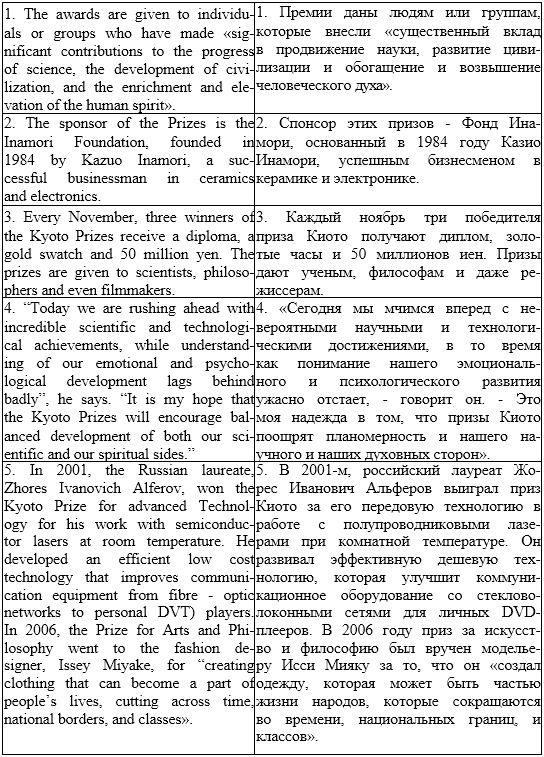Unit 3. № 80. ГДЗ Английский язык Enjoy English 10 класс Биболетова. Помогите перевести и ответить
Read the text and answer the following questions.
1 What is the purpose of the Kyoto Prize?
2 Who is the founder of the prize? What do we know about him?
3 How many people have been awarded the prize? Who are they?
4 How does the founder of the prize explain the idea behind it?
5 Who were the prize laureates in 2001? What achievement did they get the prize for?
The Kyoto Prize is Japan's equivalent of the Nobel Prize. The awards are given to individuals or groups who have made “significant contributions to the
progress of science, the development of civilisation, and
the enrichment and elevation of the human spirit." The
sponsor of the Prizes is the Inamori Foundation, found
ed in 1984 by Kazuo Inamori, a successful businessman
in ceramics and electronics. The prize is similar to the
Nobel Prize, but more inclusive as it acknowledges Arts
and Philosophy, as well as Advanced Technology and
Basic Science. Unlike the Nobel Prize, however, it is
never given to corporations.
Ever)’ November, three winners of the Kyoto Prizes
receive a diploma, a gold watch and 50 million yen. The prizes are given to scientists, philosophers and even filmmakers.
In 2001, the Russian laureate. Zhores Ivanovich Alferov, won the
Kyoto Prize for Advanced Technology for his work with semi
conductor lasers at room temperature. He developed an efficient
low cost technology that improves communication equipment
from fibre-optic networks to personal DVD players. In 2006. the
Prize for Arts and Philosophy went to the fashion designer, Issey
Miyake, for “creating clothing that can become a part of peoples lives, cutting across time, national borders, and classes.”
Inamori has criticised modern culture for ignoring our emotional and spiritual development and feels that more recognition should be given to those who work for the common good. “Today we are rushing ahead with incredible scientific and technological achievements, while understanding of our emotional and psychological development lags behind badly,” he says. “It is my hope that the Kyoto Prizes will encourage balanced development of both our scientific and our spiritual sides.”
Inamori worries that people are losing their old models of morality and ethics based on religion. But he believes that if we use our intelligence properly, we can create a new way of thinking, one that does not add to human suffering. He has now given the Inamori Foundation 70 billion Yen, which he hopes will help to recognise people who contribute to this process.
Прочитайте текст и ответьте на данные вопросы.
1. Какова цель приза Киото?
2. Кто основатель приза? Что мы знаем о нем?
3. Как много людей выиграли этот приз? Кто они?
4. Как основатель приза объясняет заднюю идею?
5. Кто были призовыми лауреатами в 2001? За какое достижение они получили приз?
Приз Киото, дабы подчеркнуть дальнейшие «моральные» достижения.
Приз Киото - это японский эквивалент Нобелевской премии. Премии даны
людям или группам, которые внесли «существенный вклад в продвижение
науки, развитие цивилизации и обогащение и возвышение человеческого
духа». Спонсор этих призов - Фонд Инамори, основанный в 1984 году Ка-
зио Инамори, успешным бизнесменом в керамике и электронике. Приз яв-
ляется подобным Нобелевской премии, но более содержательным, т.к. он
признает Искусство и философию, так же как и передовую технологию и
фундаментальную науку. В отличие от Нобелевской премии, однако, его
никогда не дают корпорациям.
Каждый ноябрь три победителя приза Киото получают диплом, золотые ча-
сы и 50 миллионов иен. Призы дают ученым, философам и даже режиссе-
рам. В 2001-м, российский лауреат Жорес Иванович Альферов выиграл
приз Киото за его передовую технологию в работе с полупроводниковыми
лазерами при комнатной температуре. Он развивал эффективную дешевую
технологию, которая улучшит коммуникационное оборудование со стекло-
волоконными сетями для личных DVD-плееров. В 2006 году приз за искус-
ство и философию был вручен модельеру Исси Мияку за то, что он «создал
одежду, которая может быть частью жизни народов, которые сокращаются
во времени, национальных границ, и классов».
Инамори раскритиковал современную культуру за то, что она проигнориро-
вала наше эмоциональное и духовное развитие, и считает, что большее при-
знание должно быть дано тем, кто работает для общественной пользы. «Се-
годня мы мчимся вперед с невероятными научными и технологическими
достижениями, в то время как понимание нашего эмоционального и психо-
логического развития ужасно отстает, - говорит он. - Это моя надежда в
том, что Призы Киото поощрят планомерность и нашего научного и наших
духовных сторон».
Инамори волнуется, что люди теряют свои старые модели этики и этики,
основанной на религии. Но он полагает, что, если мы будем использовать
нашу интеллигенцию должным образом, мы сможем создать новый образ
мыслей, тот, который облегчит страдания человека. Сейчас он дал Фонду
Инамори 70 миллиардов иен, которые, он надеется, помогут признать лю-
дей, которые способствуют этому процессу.

Work in pairs. Do the following tasks:
a) Ask and answer the questions using the prompts below. Add your own details if (Подробнее...)
Match the parts of the sentences.
1. We use language in this country in order to...
2. We fight for many (Подробнее...)
Work in pairs. Discuss one of the follow-
ing problems. Make your suggestions. Share
them with other students. (Подробнее...)
Say what you would do if you could im-
prove our world. Name the three most impor-
tant things. (Подробнее...)
Work in groups.
• Discuss the possible ways to make the world
better. (Подробнее...)















